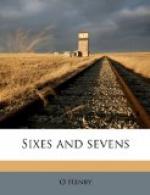“Not on your silhouette,” decided Reddy. “You see ’em rallyin’ round The Pump? They’re friends of Bill’s. Bill won’t stand for nothin’ of this kind in his district since he got that bid to Esopus.”
This exhausts the facts concerning the Kali diamond. But it is deemed not inconsequent to close with the following brief (paid) item that appeared two days later in a morning paper.
“It is rumored that a niece of Gen. Marcellus B. Ludlow, of New York City, will appear on the stage next season.
“Her diamonds are said to be extremely valuable and of much historic interest.”
XXV
THE DAY WE CELEBRATE
“In the tropics” ("Hop-along” Bibb, the bird fancier, was saying to me) “the seasons, months, fortnights, week-ends, holidays, dog-days, Sundays, and yesterdays get so jumbled together in the shuffle that you never know when a year has gone by until you’re in the middle of the next one.”
“Hop-along” Bibb kept his bird store on lower Fourth Avenue. He was an ex-seaman and beachcomber who made regular voyages to southern ports and imported personally conducted invoices of talking parrots and dialectic paroquets. He had a stiff knee, neck, and nerve. I had gone to him to buy a parrot to present, at Christmas, to my Aunt Joanna.
“This one,” said I, disregarding his homily on the subdivisions of time—“this one that seems all red, white, and blue—to what genus of beasts does he belong? He appeals at once to my patriotism and to my love of discord in colour schemes.”
“That’s a cockatoo from Ecuador,” said Bibb. “All he has been taught to say is ‘Merry Christmas.’ A seasonable bird. He’s only seven dollars; and I’ll bet many a human has stuck you for more money by making the same speech to you.”
And then Bibb laughed suddenly and loudly.
“That bird,” he explained, “reminds me. He’s got his dates mixed. He ought to be saying ‘E pluribus unum,’ to match his feathers, instead of trying to work the Santa Claus graft. It reminds me of the time me and Liverpool Sam got our ideas of things tangled up on the coast of Costa Rica on account of the weather and other phenomena to be met with in the tropics.
“We were, as it were, stranded on that section of the Spanish main with no money to speak of and no friends that should be talked about either. We had stoked and second-cooked ourselves down there on a fruit steamer from New Orleans to try our luck, which was discharged, after we got there, for lack of evidence. There was no work suitable to our instincts; so me and Liverpool began to subsist on the red rum of the country and such fruit as we could reap where we had not sown. It was an alluvial town, called Soledad, where there was no harbour or future or recourse. Between steamers the town slept and drank rum. It only woke up when there were bananas to ship. It was like a man sleeping through dinner until the dessert.




